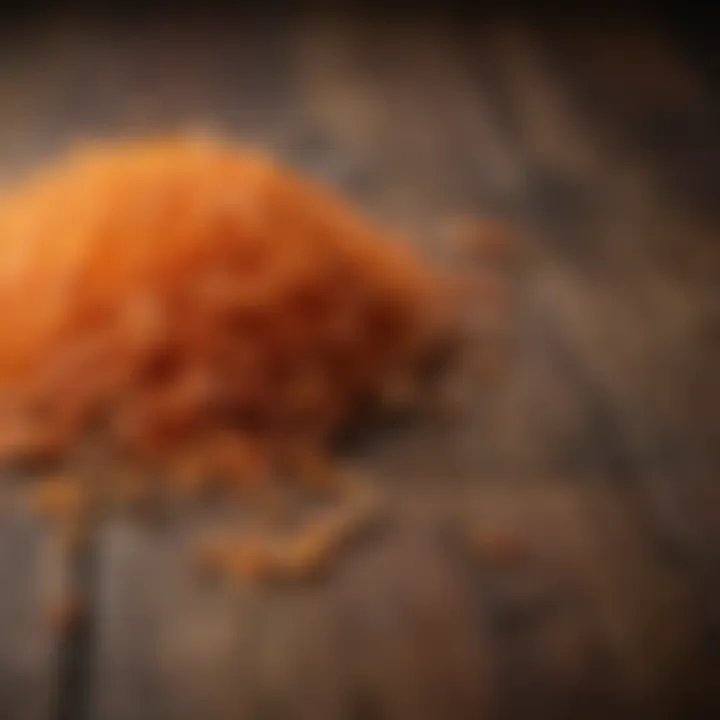Exploring Saffron Extract: A Whole Foods Perspective


Intro
Saffron extract holds a prominent place in both culinary and nutritional discussions. Renowned for its vibrant color and distinct flavor, it demands attention not only for its aesthetics but also for its extensive health benefits. This article explores saffron extract comprehensively, guiding readers through its origins, health benefits, culinary applications, sourcing, and quality evaluation in the realm of whole foods.
Saffron, the most expensive spice globally, comes from the flower of Crocus sativus, commonly known as the saffron crocus. This extract has a storied history, used traditionally in various cuisines and medicinal practices throughout history. Its nutritional profile is rich in antioxidants, vitamins, and essential minerals, making it valuable for holistic health.
Understanding saffron extract is crucial for food enthusiasts who appreciate quality and health. The following sections will provide insight into how to integrate saffron extract into a well-rounded diet, offering practical advice for both culinary use and sourcing.
Understanding Saffron: An Intro
Saffron is often hailed as the most expensive spice in the world, derived from the flower of Crocus sativus. This article aims to provide a thorough understanding of saffron's significance, particularly as it pertains to whole foods. Saffron's history, nutritional composition, and health benefits are crucial elements that underscore its value in culinary practices and holistic dietary approaches.
The prominence of saffron in diverse cuisines is not merely about its cost but also its unique flavor, color, and aroma. Beyond culinary applications, saffron's rich history and cultural importance offer insights into its enduring appeal. Exploring saffron extract helps not only in appreciating its legendary status but also enhances our knowledge of its health benefits and nutritional profile, making it a salient topic for those interested in whole foods.
Historical Significance of Saffron
Saffron has been used for over 3,000 years. Its origins trace back to Persia and later spread to various regions, including Egypt, Greece, and India. Historically, saffron has held significant value, often used as a dye, perfume, and a medicinal herb. Ancient civilizations recognized its vibrant color and distinctive flavor, which were viewed as markers of wealth and refinement. In medieval times, saffron became an integral ingredient in various dishes among the European elite. Its inclusion in meals signified not just flavor enhancement, but also an indication of social status.
Moreover, saffron was often linked with spiritual practices. It has been mentioned in religious texts and was used in rituals and traditional medicine. Understanding these aspects of saffron enriches our appreciation of this culinary treasure and encourages a more nuanced exploration of its benefits today.
Botanical Overview
The saffron plant, Crocus sativus, is a perennial flowering plant that belongs to the iris family. It reaches heights of about 30 cm and blooms in the fall, producing three vivid crimson stigmas, which are the saffron threads collected for use. The saffron plant thrives in regions with specific climate conditions: it requires full sun, well-drained soil, and a temperate climate.
Saffron flowers bloom for a short period, and the harvesting process is labor-intensive, requiring delicate handling to avoid damaging the fragile stigmas. Each flower yields only a small amount of saffron, which contributes to its high price. It is fascinating to note that approximately 150,000 flowers yield just one kilogram of saffron. Understanding this botanical background is essential for appreciating the investment behind saffron production, making it not only a culinary delight but also a significant agricultural product.
Nutritional Composition of Saffron Extract
Understanding the nutritional composition of saffron extract is essential to appreciate its role within whole food diets. Saffron extract is not only valued for its vivid color and unique flavor but also for its rich nutrient profile. This section will explore crucial elements that make saffron extract a noteworthy part of a balanced diet.
Key Nutrients Present
Saffron extract contains a variety of bioactive compounds that contribute to its potential health benefits. The key nutrients include:
- Carotenoids: This group includes compounds like crocin and crocetin, which are known for their antioxidant properties. These compoundss help in protecting cells from oxidative stress.
- Picrocrocin: Present in saffron, this compound is responsible for its bitter flavor and is associated with its mood-enhancing properties.
- Safranal: This compound contributes to the aroma of saffron and has neuroprotective effects, making it potentially beneficial for brain health.
- Vitamins: Although saffron is not your primary source for vitamins, it does contain small amounts of Vitamin C, Vitamin B6, and riboflavin. These vitamins play various roles in bodily functions, from immune support to energy metabolism.
- Minerals: Saffron provides trace amounts of essential minerals such as potassium, magnesium, and iron, contributing to overall nutrient intake.
The presence of these nutrients makes saffron extract a valuable addition to meals, not just for flavor but for its health-promoting properties.
Caloric Content and Macronutrients
When considering how to incorporate saffron extract into a diet, understanding its caloric content and macronutrient profile is important. Generally, saffron is low in calories, with approximately 20 calories per gram. This low-calorie content allows individuals to enjoy saffron without significantly increasing their daily caloric intake.
In terms of macronutrients, saffron extract is primarily composed of:
- Carbohydrates: About 65% of its weight is from carbohydrates, albeit mostly in the form of non-digestible fibers.
- Proteins: Saffron contains approximately 10-15% protein, which can contribute to daily protein needs, although not significantly.
- Fats: The fat content is minimal, generally under 5%. This makes saffron extract a fitting component in low-fat diets.
The low caloric and fat content of saffron extract, combined with its nutrient density, positions it as a beneficial ingredient in various culinary applications while maintaining dietary balance.
Health Benefits of Saffron Extract
Saffron extract is recognized for its diverse range of health benefits, making it a valuable addition to a whole foods diet. In this section, we will delve into the specific advantages that saffron extract offers, including its antioxidant properties, effects on mood and mental health, as well as its potential impact on weight management.
Antioxidant Properties
Saffron extract is rich in antioxidants, which are compounds that help combat oxidative stress in the body. Oxidative stress occurs when there is an imbalance between free radicals and antioxidants. This imbalance can lead to cellular damage and contribute to various health issues. The primary antioxidants found in saffron are carotenoids, flavonoids, and phenolic compounds. These substances work to neutralize free radicals, reducing inflammation and potentially lowering the risk of chronic diseases.


Research indicates that the antioxidant properties of saffron extract can support heart health by improving blood circulation and reducing blood pressure. Furthermore, studies have suggested that these antioxidants may play a role in protecting the brain, potentially reducing the risk of neurodegenerative disorders. Overall, incorporating saffron extract into one’s diet may contribute positively to long-term health.
Mood Enhancement and Mental Health
Saffron extract has garnered attention for its potential role in promoting mood enhancement and overall mental health. Historical uses of saffron in traditional medicine indicate its effectiveness in alleviating depressive symptoms. Recent studies have supported this perspective, demonstrating that saffron extract may provide similar benefits to conventional antidepressants.
One notable component of saffron, safranal, is believed to interact with neurotransmitters in the brain, helping to boost serotonin levels. Higher serotonin levels can lead to improved mood and reduced feelings of anxiety. Additionally, incorporating saffron extract into one’s daily diet may contribute to enhanced cognitive function, offering a natural approach to support mental clarity and focus.
Potential Role in Weight Management
Saffron extract may also play a significant role in weight management. Research suggests that saffron can help reduce appetite and curb cravings, making it easier for individuals to adhere to a healthy diet. By decreasing the frequency of snacking, saffron may prevent overeating, supporting weight loss efforts.
Furthermore, saffron extract can enhance the feeling of satiety, which contributes to better portion control during meals. There is also evidence to suggest that saffron supports metabolic health, which can be crucial for effective weight management.
"Saffron's potential in weight management comes from its ability to balance appetite and cravings, making it easier to maintain a healthy lifestyle."
In summary, the health benefits of saffron extract extend beyond its delicious flavor and vibrant color. Its capacity as an antioxidant, its positive influence on mood and mental health, and its support for weight management illustrate the versatility of this remarkable spice. Exploring these benefits allows individuals to make informed choices about incorporating saffron extract into a wholesome diet.
Culinary Uses of Saffron Extract
Saffron, known for its distinct flavor and vibrant color, holds a cherished place in culinary traditions around the world. It is not only a seasoning but also a building block of many traditional cuisines. Understanding its culinary applications allows one to appreciate its versatility and depth. The use of saffron extract in cooking can elevate dishes, contributing a unique flavor profile while also injecting a range of nutrients into meals. Its culinary significance cannot be overstated, as it bridges the gap between health benefits and gastronomic pleasure.
Traditional Dishes Featuring Saffron
Saffron has long been an essential ingredient in various cultural cuisines, especially in Mediterranean and South Asian cooking. One can find saffron risotto, a classic Italian dish, where it is combined with arborio rice, gradually absorbing broth to create a creamy texture. The saffron infuses the rice with a golden hue and a subtle flavor that characterizes this dish.
In Spain, paella is a notable dish that prominently features saffron. It requires rice, seafood, and a specific blend of spices. Saffron imparts both color and taste, making it a central element in this celebrated dish. Similarly, in Indian cuisine, biryani often includes saffron, which is used to enhance the fragrance and flavor of this elaborate rice dish. Each of these dishes not only highlights the versatility of saffron but also underscores its historical and cultural importance.
Traditional uses of saffron reflect its capability to turn a simple dish into an extraordinary culinary experience.
Innovative Culinary Applications
As the culinary world evolves, saffron is finding new roles in modern cooking. Chefs and home cooks alike are experimenting with saffron extract in innovative ways. This includes using saffron in sauces and dressings. For instance, a saffron-infused vinaigrette can add a sophisticated twist to salads, offering a layered flavor profile.
Another trend involves incorporating saffron into desserts. From saffron ice cream to saffron-infused cakes, it allows for a complex blend of flavors that can surprise and delight the palate. Furthermore, saffron tea has become popular, offering both the health benefits of saffron and a calming experience. This diverse range of applications demonstrates how saffron can adapt to contemporary culinary practices while preserving its roots in traditional dishes.
Innovative culinary uses of saffron not only showcase the ingredient’s adaptability but also inspire creativity in meal preparation.
By integrating saffron extract into both classic and modern dishes, one can journey through its rich history while also embracing new culinary trends. Incorporating saffron into everyday cooking can build a connection with diverse cultures and enhance overall meal enjoyment.
Sourcing High-Quality Saffron Extract
Sourcing high-quality saffron extract is vital for anyone looking to incorporate this remarkable spice into their diet. The quality of saffron can greatly influence both its flavor and health benefits. Saffron is often considered the most expensive spice in the world, and its reputation can attract counterfeit products. Therefore, understanding how to find authentic saffron is crucial, especially as the market grows to include various grades and forms of saffron extract.
Authenticity influences not only the taste but also the nutrient density of the saffron extract. High-quality saffron contains the right balance of carotenoids, like crocin, picrocrocin, and safranal. These compounds are responsible for the color, flavor, and aroma of saffron. When sourcing saffron, it is essential to look for these factors to ensure you are getting the maximum benefits from this superfood.
Identifying Authentic Saffron
Identifying authentic saffron requires an informed approach. Various methods can determine its quality:
- Visual Inspection: True saffron threads are a deep red hue and have a trumpet-like shape at one end. If they are too bright or possess yellow threads, they may be mixed with inferior products.
- Smell Test: Quality saffron emits a fresh and sweet scent. If it smells musty or lacks aroma, it could be stale or of low quality.
- Taste Test: Authentic saffron has a slightly bitter and sweet taste. It should not be predominantly salty or overly pungent.
- Water Test: Drop some strands in water. Real saffron threads will not lose color immediately and will impart a golden hue over time. Quick color release might indicate artificial coloring.
Knowing how to recognize genuine saffron can enhance your culinary experience and ensure you invest properly in your health.
Sustainability Concerns in Saffron Production


Sustainability in saffron production is becoming increasingly important. The rise in demand for saffron has led to over-farming in some regions, challenging the delicate balance of the ecosystem. As a consumer, understanding these issues is essential.
- Environmental Impact: The cultivation of saffron is labor-intensive, requiring specific climates and conditions. Unsustainable practices can lead to soil degradation and loss of biodiversity. Thus, sourcing saffron from producers who use sustainable methods is beneficial.
- Economic Factors: Local farmers often rely on saffron as their primary source of income. Supporting sustainable practices not only provides you with a quality product but also promotes fair trade.
- Certifications: Look for products with organic certifications or sustainability labels. This ensures that the saffron you purchase is grown in environmentally friendly conditions and supports responsible farming.
In summary, knowing how to source high-quality saffron extract is crucial for achieving both culinary satisfaction and health benefits. By identifying authentic products and considering sustainability issues, you contribute to a more responsible consumption model.
Evaluating Saffron Extract Products
Evaluating saffron extract products is a critical aspect for consumers interested in incorporating this valuable spice into their diet. Considering the rising popularity of saffron extract in health and wellness circles, it becomes essential to discern quality from mediocrity. The market is flooded with various products, some of which may not deliver the promised benefits or may even contain harmful additives.
A few pointers can help buyers make informed choices:
- Ingredients Transparency: Always check for clear labeling of the ingredients. Products that list only "saffron extract" without additional fillers or preservatives are often more trustworthy.
- Origin Information: Understanding where the saffron is sourced can indicate its quality. Saffron from regions like Iran or Kashmir is often highly regarded while those grown in less-known areas may vary in potency and flavor.
- Certifications: Reliable certifications can offer deeper assurances about a product's authenticity and production methods.
The overall experience can be significantly improved through informed buying.
Understanding Labels and Certifications
Understanding the labels and certifications present on saffron extract products can be a key factor in ensuring quality. This requires attention to detail, as not all products display the same level of transparency. Common certifications consumers may look for include:
- Organic Certification: This indicates that the saffron has been cultivated without synthetic fertilizers or pesticides, ensuring a purer product.
- GMP Certification: Good Manufacturing Practices certification signifies that the product was made according to industry standards regarding safety and quality control.
- ISO Certifications: These standards relate to the quality management systems of the producers and can reflect consistency in product quality.
When familiar with these certifications, consumers can avoid products that may not follow stringent quality controls. It is prudent to research and verify any claim made on the package.
Quality vs. Price: Making Informed Choices
Price is often a determining factor when purchasing saffron extract, but it should not be the only consideration. While a higher price frequently correlates with better quality, this is not universally true. Several factors affect pricing, such as the method of extraction, the brand reputation, and the form of saffron being sold.
When analyzing quality versus price, consider the following steps:
- Evaluate the Source: As mentioned earlier, saffron from reputable sources tends to have a higher price but also guarantees better quality.
- Compare Products: It can be helpful to compare several products. This can reveal if one product offers a better concentration of active ingredients at a similar price.
- Read Reviews: Look for customer reviews and testimonials that speak about the product's efficacy. Knowing how others have experienced the product can inform your purchasing decision.
Ultimately, balancing quality with cost is essential for making smart choices. Saffron extract can be a fantastic addition to a healthy diet, but only if you are selecting a product that is worth the investment.
Health Risks and Considerations
Understanding the potential health risks and considerations associated with saffron extract is crucial for consumers seeking to maximize its benefits while minimizing any adverse effects. While saffron is often praised for its health advantages, it is important to recognize that, like all natural substances, it can pose risks. Awareness of these risks contributes to informed dietary decisions and promotes a holistic approach to health.
Potential Allergies and Reactions
Saffron extract may trigger allergic reactions in some individuals. These reactions can manifest in various forms, ranging from mild skin irritations to more severe responses such as difficulty breathing or anaphylaxis. Symptoms of an allergic reaction may include:
- Rashes or hives: Skin reactions can occur after consumption.
- Gastrointestinal issues: Nausea, vomiting, or diarrhea may arise in sensitive individuals.
- Respiratory problems: Certain individuals might experience asthma-like symptoms.
People with known allergies to similar plants or spices should exercise caution. It's advisable to begin with small doses to assess individual tolerance. Keeping an eye on how the body reacts when trying saffron for the first time is a smart approach. If any adverse effects are noticed, one should discontinue use and consult a healthcare professional quickly.
Interactions with Medications
Saffron extract may also interact with certain medications, which can affect how those medications work. For example, saffron has been shown to have blood-thinning properties. This can make it problematic when taken alongside anticoagulants like warfarin or aspirin, which are often prescribed for heart issues or to prevent blood clots.
Specific interactions to consider include:
- Antidepressants: Saffron may interact with SSRIs, potentially increasing side effects or altering medication effectiveness.
- Diabetes medications: It could enhance the effects of medications taken for managing blood sugar levels, leading to hypoglycemia.
- Blood pressure medications: The extract might also lower blood pressure, posing risks when combined with antihypertensive drugs.
It is essential for individuals taking medications to consult their physician before adding saffron extract to their regimen to avoid potential complications.


In summary, while saffron extract offers various health benefits, recognizing the associated risks is critical. Being informed allows for a better integration of saffron into daily diets, ensuring that one can enjoy its qualities while maintaining safety and well-being.
Incorporating Saffron Extract into Daily Diet
Incorporating saffron extract into daily diet can offer various nutritional and health benefits. While its culinary uses are well-known, understanding how to effectively integrate this precious spice into everyday meals can amplify its effects. Saffron is more than just a flavor enhancer; it presents a means to enhance overall well-being.
Dosage Recommendations
When adding saffron extract to your routine, dosage is crucial. Overconsumption may lead to unwanted side effects. Generally, daily doses of saffron extract range from 20 to 30 milligrams. It is wise to start with a smaller amount to see how your body responds. For those using saffron tea, approximately 0.5 to 1 gram is considered safe. Here are a few key points regarding dosage:
- Start Small: Begin with 10 to 15 mg.
- Observation: Pay attention to how your body reacts.
- Consultation: If unsure, consult a healthcare provider.
This cautious approach can help maximize the benefits while minimizing any potential risks.
Recipes to Highlight Saffron
There are many ways to incorporate saffron extract into daily meals. It is versatile and pairs beautifully with a range of ingredients.
Saffron Rice
- Ingredients:
- Instructions:
- 1 cup basmati rice
- 2 cups water
- 1/4 teaspoon saffron threads
- Salt to taste
- Soak saffron threads in warm water for 10 minutes.
- In a pot, bring water to a boil, add salt and rice.
- Add soaked saffron with its water to the pot.
- Cover and cook on low heat until rice absorbs all water.
- Fluff with a fork before serving.
Saffron Infused Tea
- Ingredients:
- Instructions:
- 1/2 teaspoon saffron threads
- 1 cup hot water
- Honey or lemon (optional)
- Place saffron in hot water and let steep for 10 minutes.
- Sweeten with honey or add a splash of lemon if desired.
Incorporating saffron extract into your diet does not need to be complex. Just remember to enjoy it in moderation. Whether used in rice or a soothing tea, saffron offers both flavor and health benefits.
"Saffron is not just a spice; it's a doorway to enhancing health and nutrition in daily meals."
This spice deserves a place in your culinary adventures, enriching both flavor and health.
Future of Saffron in Nutrition
The future of saffron in nutrition presents a fascinating convergence of tradition and modern science. As a widely revered spice, saffron has stood the test of time due to its culinary versatility and potential health benefits. In recent years, there has been a growing interest in saffron extract within the realm of natural supplements and whole foods. This section delves into emerging research and trends that can shape the future applications of saffron in dietary practices.
Emerging Research on Saffron Extract
Current scientific inquiry into saffron extract is revealing profound implications for health and wellness. Researchers are focusing on its bioactive compounds, like crocin and safranal, which exhibit significant antioxidant properties. Studies suggest that these compounds may not only enhance mood and cognition but also play a role in combating chronic diseases such as heart disease and diabetes.
Recent clinical trials are further validating saffron’s potential benefits:
- Mental Well-being: Investigations show that saffron extract could be as effective as some antidepressants in alleviating symptoms of mild to moderate depression.
- Cognitive Function: Some studies indicate that regular consumption of saffron may improve memory and learning, making it a potential ally for neuroprotection.
- Metabolic Health: There is a growing body of evidence suggesting that saffron extract may assist in weight management and metabolic syndrome by regulating blood sugar levels.
These findings underscore the need for continued research and clinical exploration, which can pave the way for the expansion of saffron extract as a staple in health products, bridging ancient knowledge with modern health trends.
Trends in Natural Supplements
As consumers become increasingly aware of natural ingredients and holistic health, saffron extract is gaining momentum in the supplement market. The trend toward natural supplementation is fundamentally driven by several factors:
- Plant-Based Solutions: More people are seeking plant-derived products that align with their dietary preferences, especially as interest in vegan and vegetarian diets rises. Saffron offers a unique option that combines flavor with potential health benefits.
- Sustainability: There is a marked interest in sustainably sourced ingredients. Ethical sourcing of saffron not only supports local farmers but also appeals to environmentally conscious consumers.
- Consumer Awareness: The public is more educated about the origins of their food and supplements. Brands that transparently communicate saffron’s history and advantages will likely gain trust and loyalty.
Additionally, the development of saffron-infused functional foods is on the rise. This includes energy bars, beverages, and even skincare products featuring saffron for its antioxidant properties. As the landscape of health supplements shifts, saffron extract stands to play a critical role in meeting these evolving consumer demands.
"Saffron is not just a spice, but a potential key to a healthier future, combining ancient wisdom with modern nutritional science."







